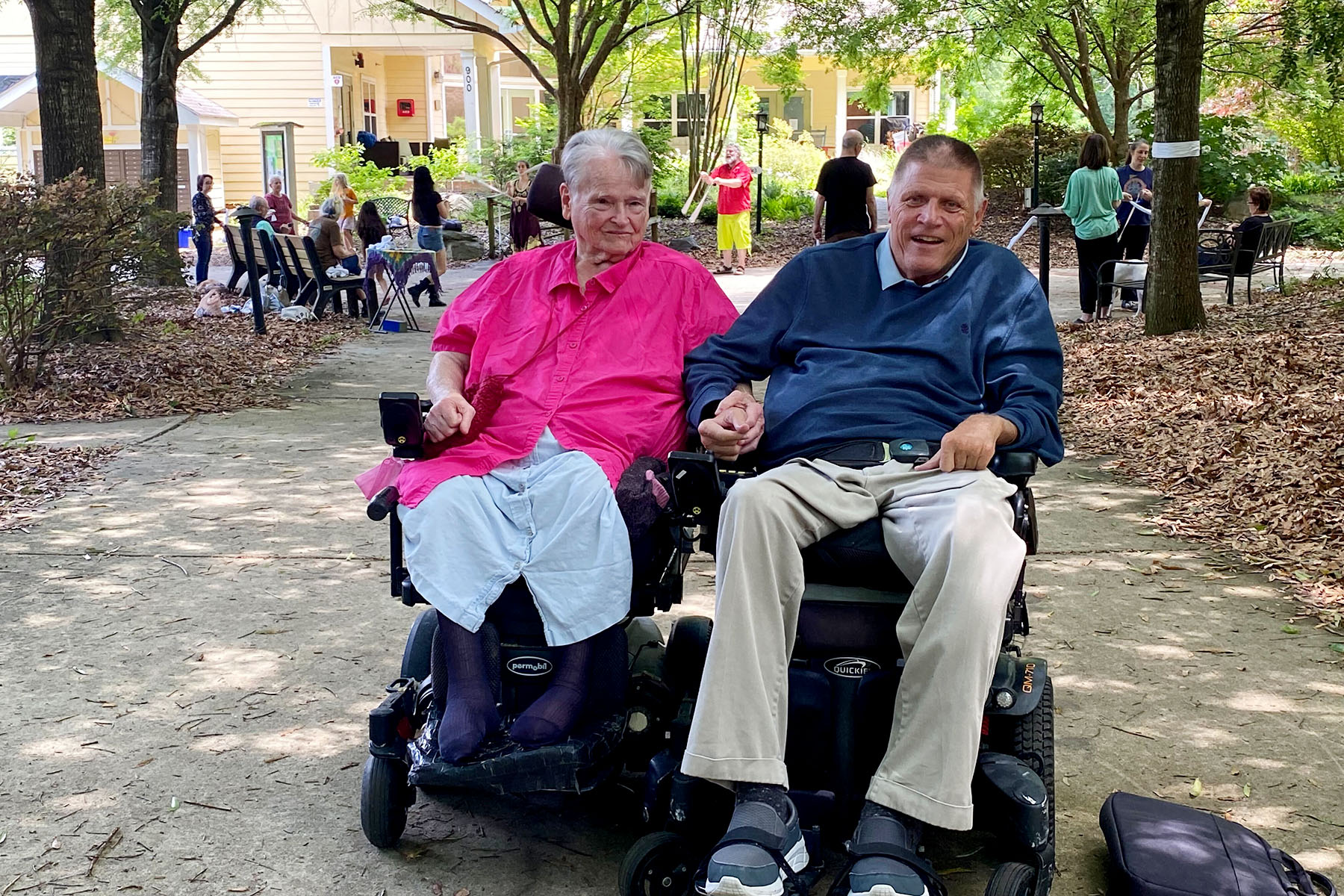This Disability Pride Month, we’re telling the untold stories of women, women of color and LGBTQ+ people. Sign up for our daily newsletter.
At 80, longtime disability rights advocate Eleanor Smith is still pushing to enact change.
Since the late 1980s, Smith has been advocating to make new homes more accessible for people who use wheelchairs or other mobility aids. The idea was born from the profound isolation experienced by Smith, who got polio as a child and was unable to easily visit many other people’s homes because they were not wheelchair accessible.
Her organization, Concrete Change, aims to make all new homes visitable. But it still hasn’t achieved “visitability” — the idea that every new home should have at least one entrance without steps, main floor doorways that are at least 32 inches wide and a bathroom on the ground floor. There is no law guaranteeing visitability at the federal level. The state of Oregon, as well as cities including Atlanta; Austin; and Urbana, Illinois, have laws guaranteeing some degree of visitability in new construction on the books.
Smith was deeply involved in some of the most formative years of the disability rights movement, including the birth of organized opposition to medical aid in dying. She was also an out and vocal lesbian during a time when homosexuality was criminalized. As part of our celebration of Disability Pride Month, The 19th interviewed Smith about her life, achievements and what she wants her legacy to be.
This interview has been edited for length and clarity.
You grew up before there was an Americans with Disabilities Act. What are some of the challenges you faced coming up as a person with a disability?
In 1946 I got polio. I was 3 years old.
During those years, the greatest damage was social attitudes. I remember everybody staring at me as a child. I remember kids walking along with their mothers, they would literally turn around backwards to look at me as much as they could. I had a lot of fun with my little group of kids that ran around the town. But other than that, I know I was pitied. That was the general attitude toward me back then.
My parents were busy with four other kids, so they didn’t micromanage me. They paid attention to me, but they didn’t have to obsess about my disability as much as if I had been an only child.
I missed social opportunities. I didn’t get invited to parties, because they knew I couldn’t get into the house [in my wheelchair]. And if I could get into the house, there was the humiliation of not being able to fit through anybody’s bathroom door. I didn’t drink before I went to someone’s house if I did go, because I didn’t want to have to try to use the bathroom.
One time, I just had to go. I was a teenager and I’d gotten invited to a rare party. I had my new green wool dress on and high heels. And I had to get out of my wheelchair, not wear my shoes, and scoot down the hall in the dark to reach the bathroom. I couldn’t turn on the light because I couldn’t reach it. I built up my upper body strength enough, I could get to the toilet, grab the seat and pull myself up. No one saw me and I got back to my wheelchair. But it still hurt my heart on a very deep level. I wanted to be a welcomed person in the world.
When I was 16, I broke my hip and needed surgery. I was in the hospital for 30 days, including during my birthday. I got a lot of cards. But I only remember one. And that was from a very good friend who was also 16. There was a horse on the front. And it said, “I know horses who have what you have.” And when you open the card, on the inside it said, “They shot them.” Even at that age, a tremor ran through me. And I didn’t blame my friend. I would have done naughty things at the same age to other people. She had no notion how that would feel. But I will never forget that spasm of fear — of realizing that is how people thought about disability.
How did you get interested in disability rights advocacy?
I was seeking fellow advocates in Georgia, and I wasn’t having any luck. Other disabled people couldn’t seem to think there was any reason for us to get together and organize for something better. Somehow I found the Disability Rag. So I was reading the Rag, and that was how I got educated.
And then my spark came to town, Mark Johnson. This was 1985 or 1986. He came to organize for ADAPT. I was still working as a junior college teacher at that time. I attended the rally he organized. It was my first rally. He brought patients from Shepherd Center, a spinal cord hospital where he was working. He had arranged them to come in one of the Shepherd Center’s vans to protest Georgia’s stance on [wheelchair] lifts on buses. This was before the [Americans with Disabilities Act] got lifts on buses.
We had lunch later. We agreed there should be a local disability rights organization. There were only four members at the beginning. We met every week in my dining room.
That was the birthplace of several organizations. The local ADAPT chapter. Life Worthy of Life, which eventually led to Not Dead Yet. It was also the birthplace of my organization, Concrete Change.
You called Mark Johnson your “spark.” What does that mean?
It means that I was waiting for people who wanted to take strong action — street action. I wanted to break the calm of some of the other disability organizations that existed. When I look back, I tell people that ADAPT was a brilliant mixture of policy work and direct action. Not many organizations are so full out for direct action, and at the same time, we were working on policy as hard as we could.
What is “visitability,” for someone who has never heard of it before?
It is action toward every new house being built with one zero-step entrance and a bathroom on the main floor. That way, anyone can visit anybody else’s home.
How did you come up with the idea?
ADAPT is the origin. ADAPT demanded a [wheelchair] lift on every new bus. And that got my mind going. If we could ask for a lift on every new bus, we could ask for basic access in every new house.
Of course, it would be totally crazy and unproductive to have as a political demand that everyone renovate their existing houses. So instead, every new house would have a zero-step entrance and wider doors.
My lover, Barbara, took me to see new Habitat for Humanity houses [in Atlanta many years ago]. It was a whole new neighborhood with 20 houses. Only one had a zero-step entrance for a disabled person. All the rest lacked access. And I thought how easy it would have been to make all of the houses accessible. Instead, they made houses their neighbor in a wheelchair would not be able to come in and visit. And that’s assuming no one would develop a disability through accident or disease or old age. They wouldn’t be able to remain in their house without paying for an expensive renovation.
So I just thought, “OK, I’ve got to start something.”
Me and Mark eventually settled on the name Concrete Change. We printed T-shirts that said “Concrete Change. Every new house with access — because you gotta visit friends and lovers.”
I thought it was so simple and so basic and so made sense on every level that it would fly along and be U.S. policy in 20 years. Well, no. That didn’t happen. But we did have an impact. [Some] cities have passed laws that say every new house must have access.
I know on the federal level there’s also the Eleanor Smith Inclusive Design Act. It’s been introduced a few times, but it hasn’t really gone anywhere. Can you tell me a little bit about your involvement?
Some advocates in Chicago had a relationship with Rep. Jan Schakowsky. It did not have my name on it until much later.
Our primary opponents were the National Association of Homebuilders. They poured on their opposition, and they are quite a big lobbying force. They buried us. They simply didn’t want to be regulated. I think they fight any regulation on principle.
Do you feel like being a lesbian shaped your approach to disability advocacy?
Yes. I bonded with other disabled lesbians on trips to go protest. I flew around the country and met quite a few disabled lesbians. Robin Stephens, Laura Hershey. Beaucoup people. Meeting them and becoming personal friends was a big deal.
I already knew the tremendous oppression of disability rights that made me already an outsider. Disability rights and women’s rights and lesbian rights all naturally go together.
Do you feel like other disability rights advocates back in the ’80s and ’90s were accepting of gay people?
They were very accepting of gay people. I remember during one of my early ADAPT actions, I was pushing along in my push wheelchair. I was wearing a flannel shirt and boots. And this guy, Eric Schroeder from Philly, wheels up to me. And he says, “Are you one of those old time dykes?” I said, “Yes.” We just looked at each other and laughed.
I didn’t feel any oppression for being a lesbian [in ADAPT and the disability rights movement]. There obviously were members who were homophobic. But there were a lot of other people who were absolutely pro gay, even in the ‘80s.
What do you want your legacy to be?
I would like my legacy to be my work. I worked for 30 years for basic access in all new houses. I want it to happen.
And that I was brave in realizing what a threat the assisted suicide movement was to our lives before many other disabled people realized, along with the few other disabled people who were getting it and pushing back.








